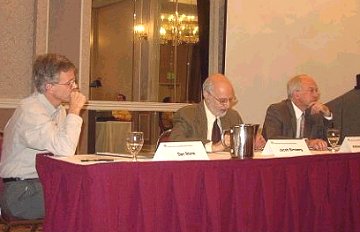 |
| Summary of Panel Discussion Panel participants were Anthony Hopwood (Oxford University), Jake Birnberg (University of Pittsburgh), and Dan Stone (University of Kentucky).
Panel on "Retreat from Methods" The session began with the comments of Professor Hopwood whose informal comments at last year's conference sparked interest in this topic. Specifically, Professor Hopwood discussed his concerns that the majority of new work in behavior and organizations is performed using experimental and quasi-experimental methods with less and less focus on field and organizational research. Although interesting work has resulted from experimental papers in the capital markets/financial reporting areas, Professor Hopwood argued that the body of knowledge generated from audit judgment research is much less satisfying. He argued there is too little cumulative knowledge and too little relevant research coming out of lab-based studies in accounting. Overall, Professor Hopwood argued that business school researchers in general have fewer links to practice than may be the case in other professional schools (e.g., law). One of the underlying causes may be current pressures on academics to perform what he termed "careerist" as opposed to "curiosity-based" research. That is, a focus on quick studies using student subjects in lab settings that add only incrementally to the body of knowledge, but ensure pre-tenured faculty a quick publication in a journal of reasonable quality. Field research, on the other hand, requires the development of longer term relationships with real managers in real organizations as well as the gathering of in-depth and sometimes longitudinal data. Although field research in real organizations has both methodological advantages and disadvantages, lab experiments may also be "deeply problematic" from a methodological point of view. Professor Birnberg then discussed his view that we may not have fully defined the problem we are trying to tackle. In his opinion, the problem may be either a focus on the wrong method and/or the failure to identify really interesting research questions. He encouraged accounting researchers to look outside of accounting for experts in methodologies with which accountants may be less familiar (including, for example, qualitative and field work). He also argued that our colleagues in management as well as management science are involved in many current studies that cross over into the field of accounting broadly defined. He encouraged accounting researchers to read widely outside of accounting when trying to formulate really interesting research questions. In addition, Professor Birnberg cautioned that realistically, some of this work would have to be published in good journals outside of the field of accounting. Professor Stone provided the final comments of the session. The theme of his comments revolved around his concern that the journals published by the AAA do not reflect the variety of research being performed by AAA members. According to Professor Stone, one explanation for the lack of variety in terms of method may be that we fail to adequately train our doctoral students in non-mainstream methodologies. In fact, Professor Stone observed that a large proportion of the doctoral consortium participants that he met at the consortium this year had little or no exposure to research outside of the mainstream capital markets-based empirical literature in accounting. If this continues, we should not be surprised that the focus of published research in accounting continues to narrow. Although all three speakers recognized the pressures on untenured accounting academics today to publish a large number of papers in what are termed "A" quality journals, they all seemed to agree that our focus should be less on the quality of journal in which the paper is published and more on the quality of the research itself. Does it ask an interesting question, apply an appropriate method, and provide some significant insights into an issue that we knew less about before the study was done? |
